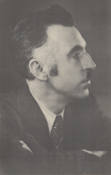Clement Wood
Clement Richardson Wood (born September 1, 1888 in Tuscaloosa; died October 26, 1950 in Schenectady, New York) was an attorney, judge, singer, educator and writer.
Wood, son of an attorney and a public elocutionist, began writing poems as a child. He earned his bachelor's degree at the University of Alabama in 1909, and edited The Corolla yearbook that year. He went on to Yale University, earning a bachelor of laws in 1911 and assisting the editor of the Yale Law Journal. He then returned to Birmingham to practice law and was appointed an assistant city attorney in 1912 and chief magistrate of Birmingham's Central Recorder's Court in 1913. He ran for President of the second Birmingham City Commission, but lost to former mayor George Ward by a wide margin.
In 1914 Wood married Mildred Mary Cummer and moved to New York City where he worked briefly worked as a waiter, on the staff of the city vice commission, and as secretary for novelist Upton Sinclair. He entered the teaching profession to support his efforts as a poet, serving as dean of the Barnard School for Boys and as a poetry instructor at New York University. He won a civic poetry competition to honor the city of Newark, New Jersey's 250th anniversary in 1917 with his work "The Smithy of God" and published his first book of poems, Glad of Earth the same year. A poet of the "Romantic" school, Wood was an active member of the New York Literary Society and the Poetry Society of America.
Over the course of his career, Wood expanded his writings to include political essays and articles and novels, some of which were published under the pen name Alan Dubois, and many more of which he ghost-wrote for publication under other names. He was hired as a lecturer on the White Star passenger ship line. He also taught correspondence courses and performed as a concert vocalist. He contributed stories to numerous pulp magazines such as Telling Tales, Gangster Stories, Flynn's and Ace-High. He met idealistic publisher Emanuel Julius on the staff of the Socialist daily New York Call in 1915 and authored more than 70 of Julius' "Little Blue Book" booklets, sold for 25-cents a piece to a mass audience of working class readers. Wood's contributions to the series, some of which dealt with sexual or ribald subjects but also included histories of religion and a still-printed rhyming dictionary, were among the firm's best-sellers. In 1936 he married fellow Little Blue Book author Gloria Goddard.
Wood suffered a stroke at home in Delanson, New York and died shortly afterward in a Schenectady hospital.
References
- Wood, Clement (1936) The Glory Road: An Autobiography. New York: Poet's Press
- Clement Wood at "This Goodly Land: Alabama's Literary Landscape"
- Landskov, Faye (3rd quarter, 2004) "Resources for Collectors: Author Profile of Clement Wood" Big Blue Newsletter
